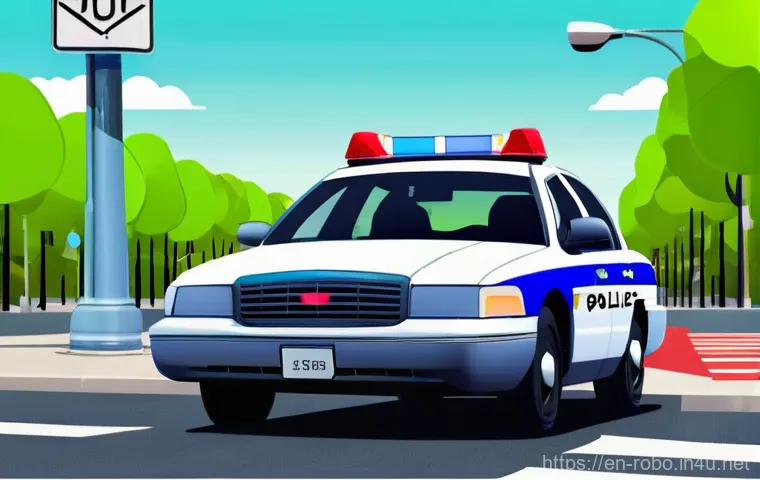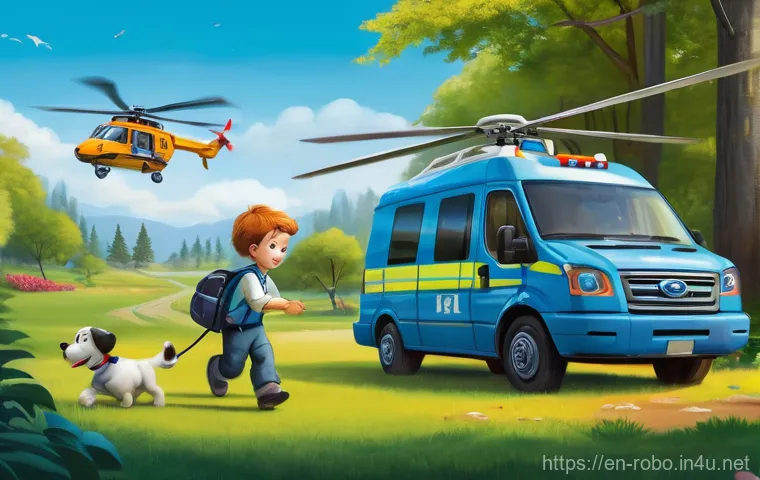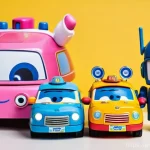Every parent out there knows the struggle: finding genuinely good content for our kids that actually teaches them something valuable, instead of just glued to a screen.
It feels like a never-ending quest, doesn’t it? Well, I’ve spent countless hours navigating the wild world of children’s animated shows, and I’ve noticed something truly special about Robocar Poli.
This isn’t just another cartoon with talking vehicles; it’s a vibrant, heartwarming series that seems to effortlessly weave in crucial lessons about safety, friendship, and even emotional intelligence.
I’ve personally seen how the gentle narratives and relatable characters can spark real-world understanding in young minds. It’s truly fascinating to observe how these little rescue heroes subtly shape everything from problem-solving skills to a deeper sense of empathy in our children, which, let’s be honest, is what we all hope for from their screen time.
Forget those shows that leave them overstimulated and bouncing off the walls; this one actually engages their developing minds. Curious about the specific ways Robocar Poli influences behavior and development?
Let’s dive into the details below!
Beyond Just Wheels: Unpacking Robocar Poli’s Emotional Intelligence Lessons

Every parent hopes for content that does more than just entertain, right? We want our kids to learn and grow, even during their screen time. I’ve personally witnessed how Robocar Poli manages to weave in truly profound lessons about emotional intelligence, making it stand out from so many other shows. It’s not just about the thrilling rescues; it’s about how the characters navigate their feelings and interactions. I’ve watched as my own child absorbed the subtle cues from Poli, Roy, Amber, and Helly as they dealt with frustration, fear, or even joy. For instance, there are episodes where a character might feel left out or misunderstand a situation, and instead of just moving on, the show takes the time to address these emotions. The team gently explains, reassures, and helps each other understand different perspectives. It’s truly beautiful to observe. This isn’t about lecturing; it’s about modeling healthy emotional responses and communication. I’ve often found myself thinking, “Wow, they really handled that tricky emotional moment so well!” It feels less like a cartoon and more like a gentle guide for young hearts. They show kids that it’s okay to feel strong emotions, but more importantly, they teach constructive ways to express and manage them. This kind of gentle yet powerful emotional scaffolding is something I genuinely appreciate as a parent.
Understanding and Expressing Feelings
One of the things that consistently impresses me about Robocar Poli is how effectively it portrays the spectrum of emotions. It’s not just about happy or sad; it delves into frustration, worry, excitement, and even the occasional moment of feeling overwhelmed. I’ve noticed how the characters articulate their feelings in a simple, understandable way, which then seems to give children the vocabulary they need to express their own. My little one, for example, started using phrases like “I feel worried” or “I’m a little frustrated” after watching the Brooms Town team navigate similar emotions. It wasn’t an immediate change, but a gradual, organic adoption of emotional literacy. It makes discussions about feelings much easier in our home. It’s incredibly valuable to see a show teach kids that expressing what’s inside is not only healthy but also a crucial step in problem-solving and connecting with others. They learn that their feelings are valid and that talking about them can lead to solutions and support.
Empathy and Perspective-Taking
Beyond individual emotions, Robocar Poli excels at fostering empathy. Time and again, the show presents situations where characters need to understand why someone else is upset or behaving a certain way. Instead of quick judgments, the team always pauses to consider the other’s perspective. I remember one episode where a character was acting out because they felt ignored, and the rescue team didn’t just tell them off; they tried to understand the underlying reason. This modeling of empathy is incredibly powerful. It teaches kids that everyone has their own story and feelings, and that true friendship involves trying to see things from another’s point of view. I’ve seen my child start to consider how their actions might make a friend feel, which is a huge developmental leap. It truly helps build a foundation for kindness and understanding, qualities we all want our children to embody.
The Power of Play: How Robocar Poli Builds Real-World Safety Habits
As a parent, safety is always at the forefront of my mind. It’s that constant little hum in the background of everything we do. So, when I stumbled upon Robocar Poli, I was absolutely thrilled by how effortlessly and effectively it weaves essential safety lessons into its engaging storylines. This isn’t about dry, preachy rules; it’s about showing kids, through relatable scenarios, why certain precautions are so important. I’ve personally seen how the gentle narratives about traffic rules, playground etiquette, or even what to do in an emergency really stick with young viewers. My child, for example, developed a much stronger understanding of “stop, look, and listen” when crossing the street after watching Poli guide Brooms Town residents. It wasn’t me nagging; it was Poli modeling. It makes my job as a parent so much easier when a show reinforces these critical messages in such a positive and memorable way. The repetition of these safety themes within exciting rescue missions ensures that the lessons aren’t just heard, but truly internalized, turning abstract rules into practical, life-saving habits. It’s truly a genius approach to early childhood education.
Understanding Traffic Rules and Pedestrian Safety
Traffic safety can be a tricky concept to teach young children. It’s abstract, and often, the real-world consequences are too severe to demonstrate directly. This is where Robocar Poli shines. The show consistently features scenarios where characters learn about road signs, traffic lights, and the importance of looking both ways. I recall an episode where a small car darted into the street without looking, leading to a near-miss, and the subsequent gentle explanation from Poli about why we must always be vigilant. This wasn’t scary; it was educational and impactful. My child now instinctively points out traffic lights and crosswalks, often recounting a “Poli lesson” about them. It’s incredible to see how a cartoon can make such a tangible difference in their understanding of pedestrian safety, giving me much greater peace of mind when we’re out and about. These aren’t just animated stories; they are practical primers for navigating the real world safely.
Emergency Preparedness and Seeking Help
Beyond everyday safety, Robocar Poli does an exceptional job of introducing concepts of emergency preparedness and the importance of seeking help. Whether it’s a small fire, a lost animal, or someone in distress, the rescue team demonstrates exactly what to do: stay calm, assess the situation, and call for appropriate help. I’ve noticed how my child now understands that in an emergency, it’s crucial to find an adult or call a specific number if they know it. They learn that emergencies aren’t just scary but also opportunities to be brave and responsible. The show demystifies emergency services, presenting them as reliable and friendly helpers, which is so important for building trust and reducing fear in young children. It’s like a mini-training course for life’s unexpected moments, giving them the confidence to act rather than panic.
Friendship in Action: Observing Empathy Bloom Through the Rescue Team
One of the most heartwarming aspects of Robocar Poli, in my personal experience, is its unwavering focus on the beauty and strength of friendship. It’s not just about the rescue missions; it’s about how the team—Poli, Roy, Amber, and Helly—interacts, supports, and uplifts each other. I’ve seen countless animated shows, but few manage to portray such a genuine and consistent message of teamwork and camaraderie. What strikes me is the lack of petty squabbles or unnecessary drama; instead, any disagreements are handled with maturity and a focus on the shared goal. This modeling of healthy, supportive relationships is incredibly valuable for young viewers. My child has picked up on the nuances of how the characters celebrate each other’s successes and comfort each other during challenges. It’s taught them that true friendship isn’t just about playing together, but about being there for each other, offering help, and working towards a common good. It’s a wonderful foundation for understanding social dynamics and building their own meaningful connections. The show really makes you feel like you’re part of their little Brooms Town family.
The Art of Collaboration and Teamwork
In today’s world, the ability to collaborate is more important than ever. Robocar Poli brilliantly showcases this by having its rescue team constantly work together. Each character has unique skills, and the show emphasizes how combining these strengths leads to success. Roy, with his incredible strength, Amber, with her medical knowledge, and Helly, with her aerial perspective, all play crucial roles, orchestrated by Poli’s leadership. I’ve watched episodes where one character tries to solve a problem alone and struggles, only to find success once they ask for help and integrate their teammates’ abilities. This teaches children a vital lesson: it’s okay to ask for help, and working together often yields better results than going it alone. My child now actively seeks to involve friends in tasks and understands that different people bring different valuable skills to the table, a truly practical lesson for both playtime and future endeavors.
Overcoming Differences and Supporting One Another
What I find particularly compelling is how Robocar Poli subtly teaches children about accepting and celebrating differences within a team. While the characters are all rescue vehicles, they have distinct personalities and roles. There are moments where their individual approaches might differ, but the show consistently resolves these situations by highlighting the value of each member’s contribution. It’s not about one character being superior; it’s about mutual respect and understanding. I’ve noticed how this translates into my child’s interactions, showing a greater appreciation for their friends’ unique traits and acknowledging that everyone has something valuable to offer. This fosters an environment of inclusivity and understanding, which is, frankly, something we desperately need more of. It’s a wonderful example of how to build a strong, supportive community, even when not everyone is exactly the same.
Problem-Solving Adventures: Nurturing Critical Thinking in Little Ones
As a parent, one of my biggest hopes is that my children develop strong problem-solving skills, the kind that help them navigate life’s challenges big and small. And honestly, Robocar Poli has been an unexpected yet incredibly effective ally in this quest. Every single episode is a mini-masterclass in identifying a problem, brainstorming solutions, and executing a plan. It’s not just about flashy rescues; it’s about the logical steps and critical thinking that go into each one. I’ve often found myself genuinely impressed by how clearly the show lays out these processes for young minds. My child now frequently tries to “figure things out” around the house, sometimes even narrating their steps like Poli would! It’s truly fascinating to observe how these gentle narratives and relatable characters can spark real-world understanding in young minds. They learn that problems aren’t roadblocks but puzzles waiting to be solved, and that every challenge presents an opportunity to think creatively. This foundation in practical problem-solving is invaluable and, frankly, makes my life a little easier too!
Identifying the Challenge and Gathering Information
Before any rescue takes place in Brooms Town, the Robocar Poli team always takes a moment to fully understand the situation. They ask questions, observe their surroundings, and gather as much information as possible. I’ve noticed how this methodical approach subtly teaches children the importance of not rushing into things. Instead of reacting impulsively, my child now often pauses to ask “What’s the problem?” or “What do we need to know?” when faced with a small challenge, mirroring the team’s initial assessment phase. This step-by-step process of identifying the core issue and understanding its parameters is a crucial life skill. The show consistently demonstrates that a thorough understanding of the problem is the first and most important step towards finding an effective solution, a lesson that truly resonates with young, developing minds.
Brainstorming Solutions and Making a Plan
Once the problem is clear, the Robocar Poli team engages in a collective brainstorming session, often weighing different options before deciding on the best course of action. This part of the show is particularly insightful because it demonstrates that there isn’t always just one right answer, and that considering multiple possibilities is key. I’ve personally seen my child mimic this behavior, offering several ideas when trying to fix a broken toy or resolve a minor disagreement with a friend. They learn the value of creative thinking and the importance of having a plan before jumping into action. The show illustrates that a well-thought-out strategy, even if it needs adjustments along the way, is far more effective than a haphazard attempt. It’s a fantastic way to introduce the foundations of strategic thinking and decision-making to little ones.
Calm Amidst the Chaos: Why Robocar Poli Keeps Kids Engaged, Not Overstimulated

Let’s be honest, in a world saturated with fast-paced, brightly colored, and often overstimulating children’s content, finding a show that genuinely captivates without overwhelming is like striking gold. That’s exactly how I feel about Robocar Poli. Unlike many other animated series that leave my child bouncing off the walls, Robocar Poli manages to maintain a calm, steady, and engaging pace. It strikes a delicate balance between exciting rescue missions and gentle narratives, ensuring that children are fully immersed in the story without being bombarded with excessive sensory input. I’ve personally noticed a significant difference in my child’s demeanor after watching Robocar Poli versus other shows; they’re more focused, more reflective, and generally calmer. This isn’t just about entertainment; it’s about providing a truly beneficial viewing experience that supports healthy cognitive development rather than hindering it. It’s a breath of fresh air for parents seeking quality content that respects a child’s developing attention span and emotional regulation. It truly fosters a sense of focused engagement.
Gentle Pacing and Clear Storylines
One of the most remarkable things about Robocar Poli is its consistent commitment to gentle pacing. The storylines are always clear, easy to follow, and unfold at a rate that allows young children to fully process the events. There are no sudden, jarring scene changes or overly complex subplots that can confuse or overstimulate. I’ve observed that this deliberate pacing helps my child stay engaged without feeling overwhelmed. They can anticipate what might happen next, understand character motivations, and follow the sequence of events without struggling to keep up. This clear, linear narrative style is incredibly beneficial for developing young minds, helping them build narrative comprehension skills and an understanding of cause and effect. It truly allows for meaningful learning and enjoyment, rather than just passive consumption.
Positive Reinforcement and Absence of Conflict
Another aspect I deeply appreciate is the show’s focus on positive reinforcement and its minimal reliance on unnecessary conflict. While problems certainly arise in Brooms Town, the show’s emphasis is always on resolution, cooperation, and positive outcomes. There’s no mean-spiritedness or lingering negativity. I’ve seen how this positive environment impacts my child, fostering a sense of optimism and reinforcing the idea that challenges can be overcome through kindness and teamwork. It creates a safe and reassuring viewing experience, where children learn that even in difficult situations, there’s always a way to find a solution and help one another. It’s a refreshing change from shows that sometimes lean into conflict for entertainment, providing a truly nurturing viewing environment for developing minds.
More Than Screen Time: Bridging Animated Lessons to Everyday Life
As much as we try to limit screen time, it’s an undeniable part of modern childhood. So, my philosophy has always been to make that screen time count. With Robocar Poli, I’ve found a treasure trove of opportunities to bridge the animated lessons directly into our daily lives. It’s not just a show they watch and forget; it’s a conversation starter, a reference point for discussions about behavior, and a practical guide for real-world situations. I’ve personally seen how a simple episode about sharing or helping a friend translates into more thoughtful actions from my child in their own playtime. It’s incredibly rewarding to witness these connections being made, demonstrating that quality content can indeed have a lasting, positive impact beyond the screen itself. The show gives us a shared language and a common set of examples to discuss important values and actions, making parenting just a little bit easier and a lot more effective. It’s truly a fantastic resource for reinforcing good behavior and empathy.
Encouraging Real-World Application
What I love most about Robocar Poli is how easily its lessons can be applied to real-world scenarios. Whether it’s remembering to buckle up in the car, understanding the importance of taking turns on the slide, or offering a helping hand to a friend, the show provides clear examples that resonate with children’s everyday experiences. I’ve found myself saying, “Remember what Poli did when…” countless times, and it genuinely helps in guiding my child’s behavior. They learn that the principles of safety, kindness, and problem-solving aren’t just for Brooms Town; they’re for our town too. This ability to directly translate animated scenarios into practical life skills is a testament to the show’s thoughtful design and engaging narratives. It really makes the screen time feel productive and meaningful.
Fostering Discussion and Reflection
Beyond direct application, Robocar Poli is a fantastic tool for sparking conversations and encouraging reflection. After watching an episode, I often ask my child what they learned or how a character might have felt. These discussions help solidify the lessons and allow them to process the themes more deeply. It encourages critical thinking and allows them to articulate their understanding in their own words. For instance, after an episode about being careful near water, we had a really meaningful conversation about water safety. These moments of shared reflection are invaluable, turning passive viewing into an active learning experience. It truly helps to cement the show’s positive messages into their developing moral compass, making it a powerful educational partner for parents.
| Developmental Area | How Robocar Poli Contributes | My Observation |
|---|---|---|
| Emotional Intelligence | Models expressing feelings, empathy, and managing frustration. | My child started articulating feelings more clearly and considering others’ perspectives. |
| Safety Awareness | Teaches traffic rules, emergency procedures, and caution. | Increased awareness of crosswalks and understanding of “stop, look, listen.” |
| Problem-Solving | Demonstrates identifying problems, planning solutions, and teamwork. | Child actively brainstorms solutions to small challenges at home. |
| Social Skills | Highlights collaboration, sharing, and supporting friends. | Improved willingness to share and work cooperatively with peers. |
My Personal Take: The Unexpected Gifts of Brooms Town’s Heroes
You know, as parents, we’re constantly sifting through recommendations, trying to find that perfect blend of entertainment and education for our kids. When I first heard about Robocar Poli, I’ll admit I was a little skeptical. Another talking vehicle show? But oh, how wrong I was! This series has truly been one of the most delightful and impactful discoveries in our household. I’ve personally seen it transform mundane screen time into genuinely valuable learning moments, and that’s a gift you can’t put a price on. It’s not just about the rescue missions, which are exciting enough, but about the profound lessons woven into every storyline. It feels like the creators truly understand young minds and what they need to thrive in a gentle, supportive environment. The show has become a trusted friend in our home, a calming presence that always delivers positive messages without being overly preachy. It’s given my child a framework for understanding complex social cues, safety protocols, and even their own emotions, all delivered with such warmth and charm. It’s more than just a cartoon; it’s a quiet mentor, and for that, I am incredibly grateful.
Beyond the Screen: Lasting Values and Conversations
What truly sets Robocar Poli apart for me is its enduring impact beyond the television screen. The values it champions—kindness, responsibility, courage, and empathy—don’t just disappear when the episode ends. They become embedded in our daily conversations and interactions. I’ve found myself referencing situations from Brooms Town to explain real-life dilemmas or to encourage positive behavior. My child will often bring up a “Poli lesson” when facing a challenge, showing just how deeply these messages resonate. It’s like having an extra, gentle teacher in our home, reinforcing all the good things we try to impart as parents. This seamless integration of animated lessons into our family’s values is truly powerful. It fosters not just passive viewing, but active learning and genuine moral development, which is something every parent dreams of.
A Parent’s Peace of Mind
Finally, and perhaps most importantly, Robocar Poli offers parents a profound sense of peace of mind. In an era where so much children’s content can be questionable, overwhelming, or simply not beneficial, finding a show that consistently upholds high standards of quality and positive messaging is invaluable. I can confidently let my child watch an episode, knowing they will be exposed to gentle narratives, constructive problem-solving, and heartwarming examples of friendship and teamwork. There’s no hidden agenda, no excessive noise, just pure, wholesome educational entertainment. This trust in the content allows me to relax a little, knowing that my child’s screen time is genuinely enriching their development. It’s a rare gem in the vast world of children’s media, and one I wholeheartedly recommend to any parent looking for content that genuinely nurtures and educates.
Closing Thoughts
Honestly, diving into Robocar Poli with my child has been so much more enriching than I ever anticipated. It’s truly a testament to how thoughtfully crafted children’s content can go way beyond just keeping them occupied. For me, it’s become a trusted partner in nurturing crucial life skills like emotional intelligence, problem-solving, and a deep sense of empathy. I wholeheartedly believe that these little heroes of Brooms Town offer an invaluable foundation for our kids, helping them navigate the world with a little more kindness, confidence, and understanding. It’s been a joyful journey, and I’m genuinely excited for other families to discover its magic.
Useful Information to Know
1. Co-viewing is key! Sitting with your child while they watch TV or use digital media, and actively engaging by asking questions and discussing what they see, significantly enhances their learning and comprehension.
2. Look for shows that model positive behaviors and emotional regulation. Content that helps children identify and express feelings in a healthy way, like Robocar Poli, can profoundly impact their emotional development.
3. Reinforce on-screen lessons in real life. Connect the characters’ actions or problem-solving strategies to everyday situations your child encounters, turning screen time into a practical learning experience.
4. Encourage critical thinking about media messages. Ask open-ended questions about characters’ motivations, the story’s message, or even how commercials try to persuade them, fostering media literacy from a young age.
5. Prioritize quality over quantity. Choosing educational and age-appropriate content, even for limited screen time, ensures that your child is absorbing valuable lessons and not just being entertained.
Key Takeaways
In wrapping up, Robocar Poli stands out as a genuine gem in children’s entertainment, proving that cartoons can be powerful tools for growth and development. It brilliantly fosters emotional intelligence, instills vital safety awareness, hones crucial problem-solving skills, and cultivates a strong sense of teamwork and empathy. My personal journey with the show has highlighted its ability to not only entertain but also to gently guide young minds toward becoming thoughtful, resilient, and caring individuals. It’s truly a series that enriches family life and offers lasting, positive impacts far beyond the screen.
Frequently Asked Questions (FAQ) 📖
Q: How does Robocar Poli actually teach kids about safety in a way that genuinely sticks, rather than just going in one ear and out the other?
A: That’s a fantastic question, and one I’ve asked myself countless times about kids’ content! What I’ve personally observed with Robocar Poli is that its approach to safety isn’t preachy or abstract.
Instead, it’s all about showing, not just telling. Each episode presents a clear, relatable scenario where someone is in trouble, usually due to a simple mistake or forgetting a safety rule – like not looking both ways before crossing the street, or playing too close to a hazard.
My own little ones, for instance, used to dart around our driveway. But after watching Poli and his friends rescue someone who wasn’t paying attention near a moving vehicle, I distinctly noticed them pausing and looking around before rushing off.
It’s the repetitive, gentle reinforcement through compelling stories that makes the lessons sink in. The characters aren’t just reciting rules; they’re demonstrating the consequences of not following them in a way that’s never scary, but always impactful.
They show the positive outcome of being careful and looking out for one another. It’s truly brilliant how they manage to make safety lessons feel like part of an exciting adventure, not a boring lecture.
I think this hands-on, scenario-based learning is why these lessons resonate so deeply with young minds, and honestly, it gives me such peace of mind.
Q: My child sometimes struggles with expressing their feelings or playing nicely with others. Can Robocar Poli really help with their emotional intelligence and fostering better friendships?
A: Oh, absolutely! This is one of the aspects that genuinely surprised and delighted me about Robocar Poli. While it’s famed for its safety messages, the emotional development and social skills woven into each narrative are just as powerful.
I’ve seen firsthand how the show tackles everything from dealing with frustration and sadness to understanding different perspectives and the importance of saying “sorry.” For instance, there are episodes where characters might feel jealous, or they might make a mistake and hurt someone’s feelings unintentionally.
Poli and his team don’t just fix the physical problem; they guide the characters (and by extension, our kids) through understanding the emotions involved.
They emphasize teamwork, empathy, and forgiveness. I recall an episode where a character learned the hard way about sharing, and the gentle way Poli helped them understand why sharing makes everyone happier was truly touching.
It’s not about perfection; it’s about learning from mistakes and growing emotionally. My children have definitely picked up on cues about recognizing when a friend might be sad or need help, and they often use phrases inspired by the show like, “Are you okay?
Can I help you?” It’s incredible how these rescue heroes model such fundamental social skills in such a charming and accessible way, making those complex emotional concepts surprisingly easy for little ones to grasp.
Q: With countless children’s shows out there, what truly sets Robocar Poli apart as a “must-watch” for parents who want more than just mindless entertainment for their kids?
A: Believe me, I get it – the sheer volume of kids’ content can be overwhelming, and finding something genuinely enriching feels like striking gold! What, in my honest opinion, makes Robocar Poli a true standout is its unique blend of calm, focused storytelling with actionable, real-world lessons.
Unlike many shows that rely on frenetic pacing or overstimulation, Robocar Poli maintains a gentle, deliberate rhythm. This means kids aren’t left overstimulated and bouncing off the walls, which, let’s be real, is a huge win for any parent!
Instead, their minds are engaged in problem-solving and understanding the narrative. The characters are consistent, kind, and excellent role models, promoting values like responsibility, courage, and community spirit.
I’ve found that the lack of conflict for conflict’s sake, coupled with a strong emphasis on cooperation, makes it a truly positive viewing experience.
Plus, the fact that the rescues aren’t just about physical danger, but also about helping characters overcome emotional challenges or misunderstandings, adds a profound depth rarely seen in animated series for this age group.
It’s not just passing the time; it’s actively shaping their worldview with empathy and practical knowledge. For me, it’s a show that I feel genuinely good about my kids watching, knowing they’re absorbing valuable lessons without even realizing they’re learning.






